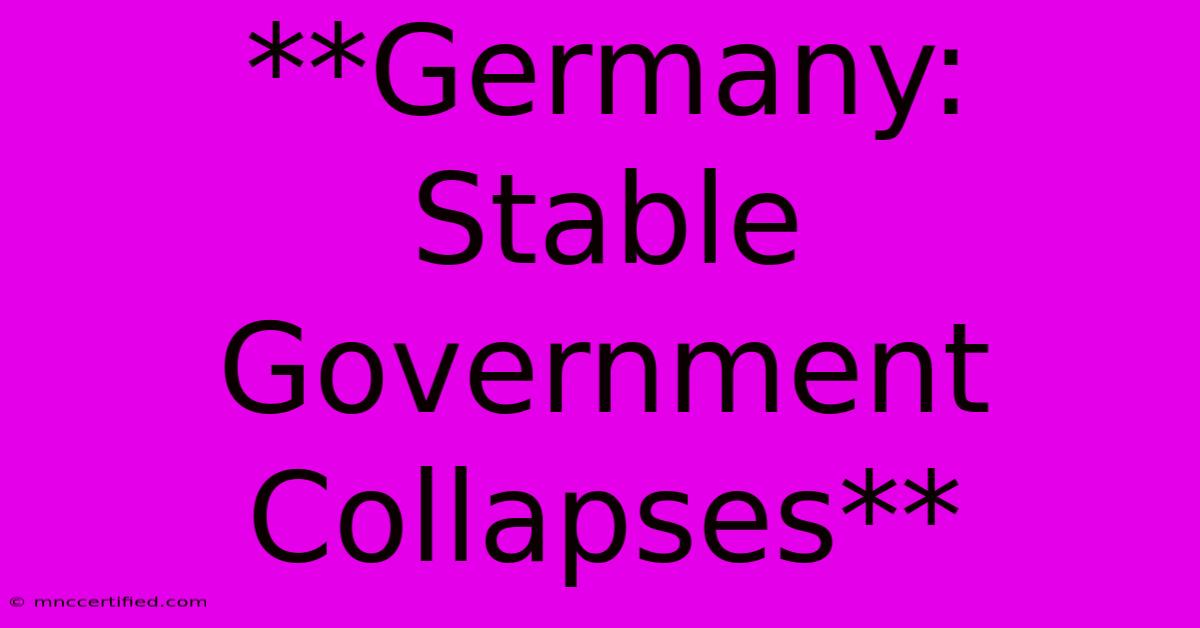**Germany: Stable Government Collapses**

Table of Contents
Germany: Stable Government Collapses - What Now?
The political landscape in Germany has shifted dramatically, with the unexpected collapse of the long-standing coalition government. This news has sent shockwaves across the nation and internationally, raising critical questions about the future of German politics and its role in the European Union.
The Unforeseen Crisis
The coalition, formed in 2021 by the Social Democratic Party (SPD), the Green Party, and the Free Democratic Party (FDP), had promised stability and continuity. However, a series of internal disputes and policy disagreements have ultimately led to its demise. Key issues that fueled the conflict include:
- Climate Policy: The Green Party's ambitious climate targets clashed with the FDP's focus on economic growth and its reluctance to introduce stricter regulations on industries.
- Defense Spending: Diverging views on increasing defense spending to meet NATO targets strained the coalition further.
- Immigration: The handling of immigration, particularly the influx of refugees, became a source of ongoing contention.
These disagreements, coupled with rising public dissatisfaction with the government's performance, culminated in the coalition's disintegration.
The Aftermath: Uncertainty and New Elections
The collapse of the government triggers a period of uncertainty and political instability. The current chancellor, Olaf Scholz, will likely remain in power as caretaker until new elections can be held. This process could take several months, potentially impacting key policy decisions and international negotiations.
The future of Germany's political landscape is now shrouded in uncertainty. Key questions remain:
- Will the existing parties retain their influence or will new political forces emerge?
- Will the next government be able to form a stable coalition?
- What impact will this have on Germany's role in the EU and its global position?
The Road Ahead: Opportunities and Challenges
While the current situation presents challenges, it also opens up opportunities for political reform and potentially a shift in priorities.
- Public engagement: The crisis could encourage greater public participation in the political process and lead to increased scrutiny of policy proposals.
- Renewed focus on core issues: The focus on key policy areas like climate change, defense, and social welfare could lead to more effective and sustainable solutions.
- Strengthened alliances: The political instability could push for more collaboration between political parties and stakeholders to ensure political stability and effective governance.
The coming months will be crucial for Germany as it navigates this uncharted territory. The outcome of the upcoming elections and the subsequent formation of a new government will shape the future of Germany and its role in the global political landscape.
Keywords: Germany, coalition government, collapse, political instability, SPD, Green Party, FDP, climate policy, defense spending, immigration, elections, uncertainty, opportunities, challenges, future, EU.

Thank you for visiting our website wich cover about **Germany: Stable Government Collapses** . We hope the information provided has been useful to you. Feel free to contact us if you have any questions or need further assistance. See you next time and dont miss to bookmark.
Featured Posts
-
Average Book Of Business Insurance Agent
Nov 08, 2024
-
Burnley Denied By West Brom In 0 0 Draw
Nov 08, 2024
-
Watch Bengals Vs Ravens Todays Game Info
Nov 08, 2024
-
Chelsea Vs Fc Noah Conference League Match
Nov 08, 2024
-
Waiver Of Subrogation Property Insurance
Nov 08, 2024